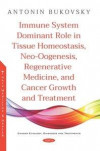 |
|
Immune System Dominant Role in Tissue Homeostasis, Neo-Oogenesis, Regenerative Medicine, and Cancer Growth and Treatment
Antonin Bukovsky
eBook. Nova Science Publishers, Inc. 2019-06-18.
ISBN 9781536154887
|
|
|
|
Buy from Amazon.co.uk
|
Publisher description
The dominant role of the immune system in managing homeostasis of distinct normal tissues and in stimulating cancer growth in regenerative medicine for gonadal infertility and aging diseases, effective immunotherapy without adverse events of inoperable epithelial ovarian cancers (EOCs), and long-lasting cancer immune prophylaxis are reported. Beside their well-known role in immunity, the blood mononuclear cells belong to the complex tissue control system, where they serve the homeostatic function by stimulating the proliferation of tissue stem cells followed by cellular differentiation, which is stopped after attaining the tissue-specific functional stage. Transfused blood from young donors could temporarily restore fertility in infertile individuals and alleviate aging diseases. This can be enhanced by the honey bee propolis that activates the thymus. An additional promising aspect for neuronal, vascular, and heart disorders is combination of sex steroids stimulating proliferation and differentiation of endogenous stem cells. Growth of cancers exhibiting expression of allogeneic antigens, is in vivo enabled by fusion of cancer cells with the host cells. This mechanism is physiologically reserved for the mammalian ability to support implantation of allogeneic embryo and fetal growth. Treatment of EOCs conventionally consists of cytoreductive surgery and platinum-based chemotherapy, but 80% of patients experience relapses with a median progression-free survival of 12 to18 months. So, the prevention of relapses, particularly in EOCs, remains problematic. Beside partial improvement of cancer treatment by immune checkpoint inhibitors that, however, cause adverse events ranging from mild to lethal, the EOCs exhibit objective reply in about 10% only. Previous preclinical experiments indicate that the combination of systemic cyclophosphamide with intradermal injections of bacterial toxins and allogeneic sensitization by white blood cells may be an effective immunotherapy for human cancers. Treatments with intermittent doses of cyclophosphamide, combined with intradermal bacterial toxins and blood transfusions, eliminates host antibodies blocking anticancer T cell effectors, enhances anticancer immune reactivity, and augments immune reactivity against alloantigens of cancer cells. This approach was not accompanied by any adverse events and resulted of regression of inoperable EOCs and regeneration of abdominal cavity tissues affected by cancer metastases during the subsequent treatment-free periods. Untreated colorectal cancer regressed after severe toxic dermatitis lasting over one week caused by an accidental ingestion of the raw shiitake mushroom. Subsequent weekly ingestions of the raw shiitake mushroom containing lentinan, accompanied with daily metformin, both stimulating immune reactivity against cancer stem cells, resulted in cancer prophylaxis over 25 years, without any recurrent dermatitis. Effective immunotherapy without side effects for advanced inoperable cancers, accompanied by regeneration of metastatically altered tissues, and long-lasting immune prophylaxis of cancers is the goal of our approach. Given the poor outcomes of patients with advanced EOCs and former reports of successful treatments using immunologic enhancement, this area needs to be re-visited with modern clinical trials. Immune system preparations for EOC rejection without adverse events may be effective during subsequent treatment-free period, when the sensitized immune system is able to reject cancer cells without being otherwise influenced. The extended survival of cancer patients could be achieved by continuous use of substances maintaining long-term immune reactivity against cancer stem cells
Similar books
Rate the book
Write a review and share your opinion with others. Try to focus on the content of the book. Read our instructions for further information.
Immune System Dominant Role in Tissue Homeostasis, Neo-Oogenesis, Regenerative Medicine, and Cancer Growth and Treatment
Book reviews » Immune System Dominant Role in Tissue Homeostasis, Neo-Oogenesis, Regenerative Medicine, and Cancer Growth and Treatment
|
|
 |
 |
|
|
|

